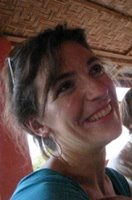Patrick Kennedy Visits Peace Corps Cape Verde*
 Just outside Serra Malagueta’s Protected Areas office, a cluster of volunteers and Cape Verdean and American officials milled around a massive bus. Inside it, on an obscured seat sat congressman Patrick Kennedy (D-Rhode Island), nephew of the illustrious founder of the Peace Corps. With each moment of waiting, the gulf between his family’s enormous legacy of service and our own comparably paltry Peace Corps projects seemed to grow.
Just outside Serra Malagueta’s Protected Areas office, a cluster of volunteers and Cape Verdean and American officials milled around a massive bus. Inside it, on an obscured seat sat congressman Patrick Kennedy (D-Rhode Island), nephew of the illustrious founder of the Peace Corps. With each moment of waiting, the gulf between his family’s enormous legacy of service and our own comparably paltry Peace Corps projects seemed to grow.He dismounted, a sandy haired young man with a sincere smile. As introductions were made, thunderous beats emerged from the office. The batukadeiras of Serra Malagueta had begun pounding rhythmic beats on improvised drums to coax their leader to dance.
Suddenly, Kennedy jumped into the circle and with good-natured abandon, tied a scarf around his waste and began to gyrate himself. Batukaderias, volunteers and officials all relaxed and smiled.
The whole entourage clustered at the door, to watch: Roger Pierce, the U.S. Ambassador to Cape Verde; Patrick Dunn U.S. Chargé d’affaires; Fatima da Veiga, Cape Verdean Ambassador to the U.S.; Maria de Resereção Lopes da Silva, the Deputy of the Cape Verdean Diaspora, Dr Stahis Panagides, Director of the Millennium Challenge Corporation; Cristano Barros, the Vice Rector of UniCV, and Dan Murphy, congressional aide to Representaive Kennedy. Representing the Peace Corps, Country Director Hank Weiss, Education APCD Yonis Reyes and volunteers Nick Hanson, Courtney Phelps, Brian Newhouse, and Alex Alper also attended.
As the drumming ceased and Kennedy untied his improvised pano de terra, Maria Teresa Vera Cruz, National Coordinator of the Protected Areas Project, briefly presented the project’s history, goals, and current works. Early that morning, he received a similar briefing at Assomada’s Grão Duque Henri technical school, where he learned about Newhouse and Hanson’s solar still project, and received general comments on technical education in Cape Verde.
“It was clear he didn’t just want to know what projects we were doing,” Newhouse, ’09 said. “He wanted to talk to the técnica students and really see what kind of an impact we were having.” Beyond the successful construction of the still, for example, Kennedy wanted to know if the students were really involved in the project and could apply their knowledge elsewhere.
“What I liked best was how intuitive Kennedy was with his questions,” said Nick Hanson, ‘08. The Representative, according to Nick, cut to the heart of the schools’ current challenges. He touched on issues like employability of graduates, the need for teacher training, use of hands-on teaching techniques, and sustainability of volunteer projects.
Courtney highlighted his egalitarianism. “He didn’t direct his questions only to the highest officials, but rather to the people who could answer the question best—to students, volunteers, or to the School Director.”
For Hank Weiss, the visit had a more personal significance. “I was a young man when Patrick Kennedy’s uncle created the Peace Corps, and when Robert Schriver became its first director. Knowing Patrick came from their family was very powerful.”
As Kennedy held out signed copies of Rhode Island souvenir books to us at the visit’s end, we received a souvenir of much more lasting impact: He told us that Washington was not currently promoting and supporting programs like the Peace Corps. Despite that, the Peace Corps volunteers of Cape Verde had chosen to serve of their own volition. He promised to do what he could to improve the current situation, and commended us for our selfless choice.
“Its like what your uncle said,” Hank said. “Ask not what your country can do for you but what you can do for your country.”
“He sure knocked that one out,” Kennedy responded, smiling.
*For PC CV Newsletter


0 Comments:
Post a Comment
<< Home